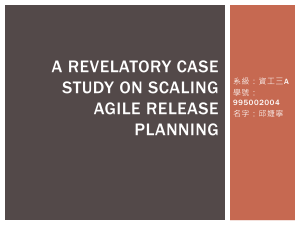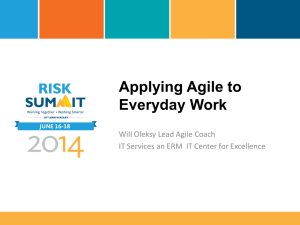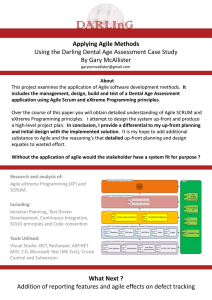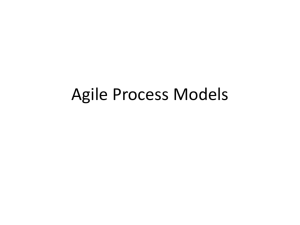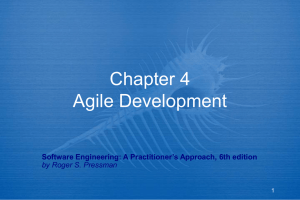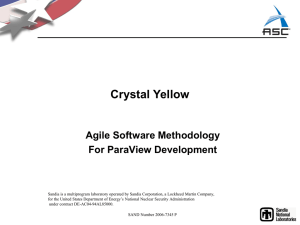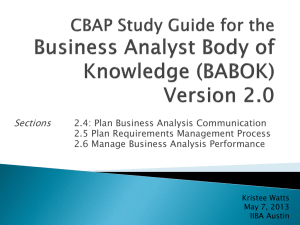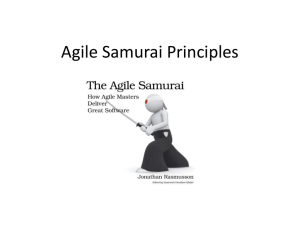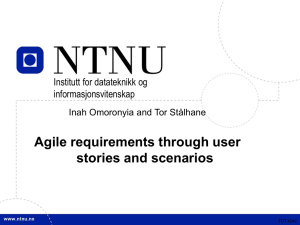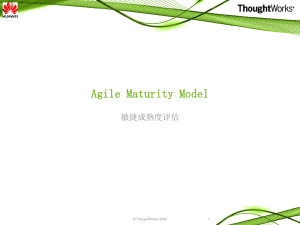Continuous Delivery and Continuous Integration
advertisement
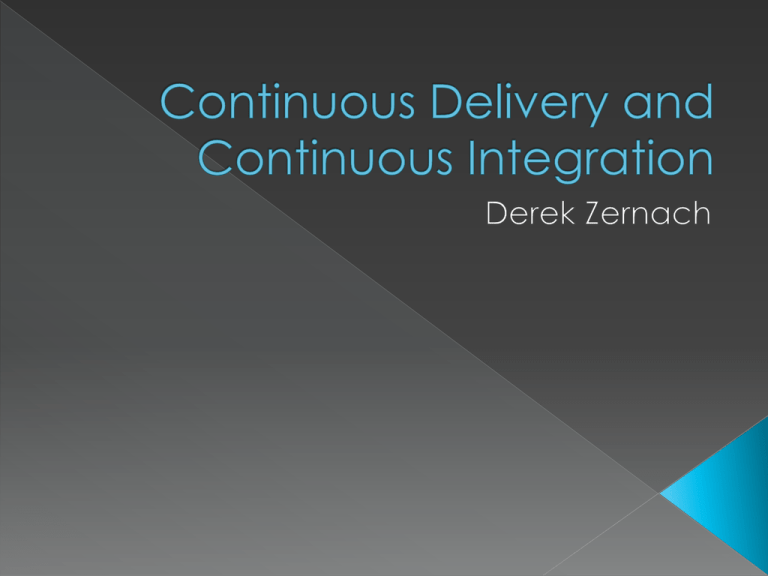
Definitions Background/History Continuous Delivery › How to practice Continuous Delivery Continuous Integration Continuous Integration Tools Continuous Delivery Summary Agile Development Process: ”An iterative and incremental (evolutionary) approach to software development which is performed in a highly collaborative manner by self-organizing teams within an effective governance framework with "just enough" ceremony that produces high quality solutions in a cost effective and timely manner which meets the changing needs of its stakeholders.” – Scott Ambler Agile Manifesto: Principles that outline the Agile Process Continuous Delivery: New software development process that aims to build software that is always ready to be deployed into production Continuous Integration: Technique where every developer on a project must integrate their work daily with every other developer Agile Manifesto was written in 2001 › Martin Fowler › Kent Beck XP Explained › They both wrote about Continuous Integration around the year 1999 ThoughtWorks Studios Continuous Delivery: Book written by Jez Humble and David Farley in 2010 Recall: Build software that is always ready to be deployed into production Is this a new idea? 1st principle of the Agile Manifesto: › “Our highest priority is to satisfy the customer through early and continuous delivery of valuable software.“ Goal: Release to production more often › Monthly › Weekly › Daily Pros: Receive many benefits from the Agile process as well as others › Build the right product Constant feedback from customers Write thorough acceptance tests › Earlier benefits Get product out before competitors Find bugs earlier › Ability to react quickly to change Not a huge amount of time and money can be abandoned to adopt new requirements › Save money and time Save money and time is project goes bad Save money and time with automation As deploying to production becomes easier, more time can be spent developing valuable features Pros cont: › Reliability Basics to start practicing Continuous Delivery › Configuration Management › What needs to be kept under CM? Everything! Code Tests Configuration Files Build Scripts Environments Documentation Etc. Stay away from branching except in special cases › Branch on releases › Horror story example You must always check into the trunk! › Otherwise you’re not continuously integrating What if your project team is releasing to production every week, but you’re working on a feature that will take longer than the release cycle to implement? First option: › Gradually release feature into production Second option: › Feature toggle Must have multiple environments when developing software Need to be able to duplicate environments with ease Environments configurations to take consideration of: › Operating systems including their framework and settings › Packages needed to be installed for the application to function properly › Network settings Tools to help configure environments in an automated fashion: Vital step when practicing CD Recall: To practice CI, every developer on a project must integrate their work daily with every other developer › Everyone on the team needs to practice this for it to work Continuous integration is not a tool, but a technique › But there are many open source tools to help practice CI Things a CI server can do: › After you check-in code it can: Run build/test scripts Notify developers of a failed build or failed tests › Can show all past check-ins and if they failed or passed all the tests › Can keep track of multiple projects › Plus much more!! Demo open source CI tools TeamCity and Hudson Heart of Continuous Delivery Will give immediate feedback for how ready your software is for production Automate everything(unit tests, acceptance tests, performance tests,…) to the point of just being able to click a button to deploy to production Continuous Delivery Assembly Line Metaphor Agile Modeling (AM) Home Page: Effective Practices for Modeling and Documentation. (n.d.). Agile Modeling (AM) Home Page: Effective Practices for Modeling and Documentation. Retrieved April 15, 2013, from http://www.agilemodeling.com/ Waters, K. (n.d.). 7 Reasons why Continuous Delivery needs to be a BUSINESS initiative | All About Agile. All About Agile | Agile Development Made Easy!. Retrieved April 16, 2013, from http://www.allaboutagile.com/7-reasons-why-continuousdelivery-needs-to-be-a-business-initiative/ Martin Fowler. (n.d.). Martin Fowler. Retrieved April 16, 2013, from http://martinfowler.com/ Shore, James. "James Shore: Continuous Integration on a Dollar a Day." James Shore: The Art of Agile. N.p., n.d. Web. 19 Mar. 2013. <http://www.jamesshore.com/Blog/ContinuousIntegration-on-a-Dollar-a-Day.html>. Agile ALM for Software Development from ThoughtWorks Studios. (n.d.). Agile ALM for Software Development from ThoughtWorks Studios. Retrieved April 17, 2013, from http://www.thoughtworks-studios.com/ Puppet Labs. (n.d.). Puppet Labs: IT Automation Software for System Administrators. Retrieved April 16, 2013, from https://puppetlabs.com/ Configuration management software | Open source configuration management - CFEngine - Distributed Configuration Management. (n.d.). Configuration management software | Open source configuration management - CFEngine - Distributed Configuration Management. Retrieved April 17, 2013, from http://cfengine.com/ Allspaw, J. (n.d.). Ops Meta-Metrics: The Currency You Pay For Change. Upload & Share PowerPoint presentations and documents. Retrieved April 17, 2013, from http://www.slideshare.net/jallspaw/ops-metametrics-the-currencyyou-pay-for-change Selenium - Web Browser Automation. (n.d.). Selenium - Web Browser Automation. Retrieved April 17, 2013, from http://docs.seleniumhq.org/ Three Rivers Institute. (n.d.). Three Rivers Institute. Retrieved April 17, 2013, from http://www.threeriversinstitute.org "Continuous Integration for Everybody — TeamCity." JetBrains :: World's Leading Vendor of Professional Development Tools. N.p., n.d. Web. 19 Mar. 2013. <http://www.jetbrains.com/teamcity/>. Manifesto for Agile Software Development. (n.d.). Manifesto for Agile Software Development. Retrieved April 14, 2013, from http://agilemanifesto.org Humble, Jez, and David Farley. Continuous delivery. Upper Saddle River, NJ: Addison-Wesley, 2011. Print.
